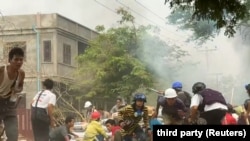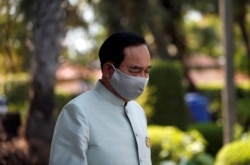On March 20, Thai media reported that the Thai military provided rice and other food supplies across the border to Myanmar soldiers operating in Myanmar’s Karen state.
According to those reports, 700 bags of rice and other foodstuffs were sent to Mae Sariang District in Thailand’s Mae Hong Son province, on the border with Myanmar, for subsequent delivery to a military base.
Citing unspecified security sources, Transborder News said that Myanmar requested the supplies from Thailand after the Karen National Union (KNU), the political wing of the Karen people’s insurgent group, cut off supply routes for Myanmar military units.
“This transport of supplies is known to have been ordered by the central Thai government. And these rice trucks are from Mae Sot District, Tak Province, where Thai security forces have sent supplies to the [Myanmar] army,” a security source told Transborder News.
Photographs circulating on social media show a shipment stacked up near the Salween River, a section of which forms the border between Myanmar and Thailand.
A local Myanmar activist posted a video with what she described as four soldiers who had crossed over to the Thai side walking around the bags of rice.
That purported aid comes as rights groups say humanitarian supplies are blocked for Myanmar villagers who fled to border areas to escape state-sponsored violence.
The Myanmar nonprofit Assistance Association of Political Prisoners estimates that 261 people have been killed since the Tatmadaw (military) launched a coup on February 1. Another 2,682 have been arrested, charged or sentenced to prison terms, including members of the deposed government.
They include civilian leader Aung San Suu Kyi, who has been charged with bribery and corruption.
Bencha Saengchantra, a member of Thailand’s parliament from the opposition Move Forward Party, tweeted that giving provisions to Myanmar’s army was tantamount to encouraging them “to kill.”
Rachada Dhnadirek, a Thai deputy government spokeswoman, sent a tweet on March 20 addressing “rumors” that the Thai military was supplying rice to Myanmar troops.
She wrote that Major General Amnat Srimak, commander of the Thai military’s Naresuan Force, which operates in the region, “insisted that no Thai soldiers sent supplies to Myanmar soldiers and Myanmar has never [requested it] from Thailand.”
It is unclear if the shipments came directly from the Thai military. However, contradictory statements by Thai officials have only raised suspicions.
According to Reuters, Amnat acknowledged such a shipment could have been delivered, but termed it “regular commerce at normal border crossings.”
“We are not blocking this if the conduct is not against the law and follows customs procedures,” he said.
However, a Bangkok Post report on March 21 seemed to directly implicate the Thai military. “[The] Third Army Region yesterday defended sending food supplies to Myanmar troops,” the newspaper said.
That story cited Lt. Gen. Apichet Suesat, chief of the Thai military’s Third Army Region, where the Naresuan Force operates. Apichet said the Myanmar troops had purchased goods from Thai operators through the Township Border Committee (TBC) for logistical reasons.The TBC is a bilateral mechanism for Myanmar and Thailand to handle border issues on the provincial level.
“It's more convenient for them to buy from Thai vendors. And it is also good for the local economy because the goods are supplied by Thai vendors,” he said.
Apichet noted Myanmar troops have been buying food from Thai vendors under the TBC arrangement for several years.
Adding to the confusion, Thai Prime Minister Prayut Chan-o-cha subsequently denied the Thai army had supplied rice to the Myanmar army, according to a March 22 report in Khaosad English, another Thai news outlet.
“It’s a different story,” Prayut was quoted as saying. “It’s quite difficult to get around on the other side, so many people would cross the border to buy goods on Thai side. Myanmar is not requesting assistance from Thailand. It’s their internal affairs and they wouldn’t come to us.”
On March 21, the KNU released a statement insisting it has a “zero-tolerance policy” toward supplying rice to the Myanmar army.
“The people of Burma and the international community have yet to recognize the Burmese military junta as a legitimate government. Therefore, any group or individuals attempting to deliver food to the Burma Army would be seen as aiding the Burma military to stay longer in our territories and fueling the Burma Army’s atrocities against our people. Failure to obey this warning and the consequences thereof is solely the responsibility of the perpetrators,” the statement says.
That same day, the governor of Mae Hong Son ordered the temporary closure of its five border areas that were designated for trade between Myanmar and Thailand, ostensibly to stop the spread of COVID-19.
However, villagers in Mae Sam Laep, where the rice was delivered, claimed they have not been able to engage in such trade since March 2020 due to pandemic measures.
Following the KNU warning and numerous reports of gunfire around a nearby Myanmar military base, located on the opposite side of the river, villagers have asked the Thai government to resolve the situation as quickly as possible.
Further muddying the waters, Lt. Gen. Santi Phongthampiya, a Thai army spokesman, said that cross-border trade was in fact being conducted as usual.
“The military is not involved in or runs any of these [trade] matters. The authorities [have] not block border trade if it is operating within the legal framework and in accordance with customs procedures,” Thai PBS, a public broadcasting service in Thailand, quoted him as saying.






